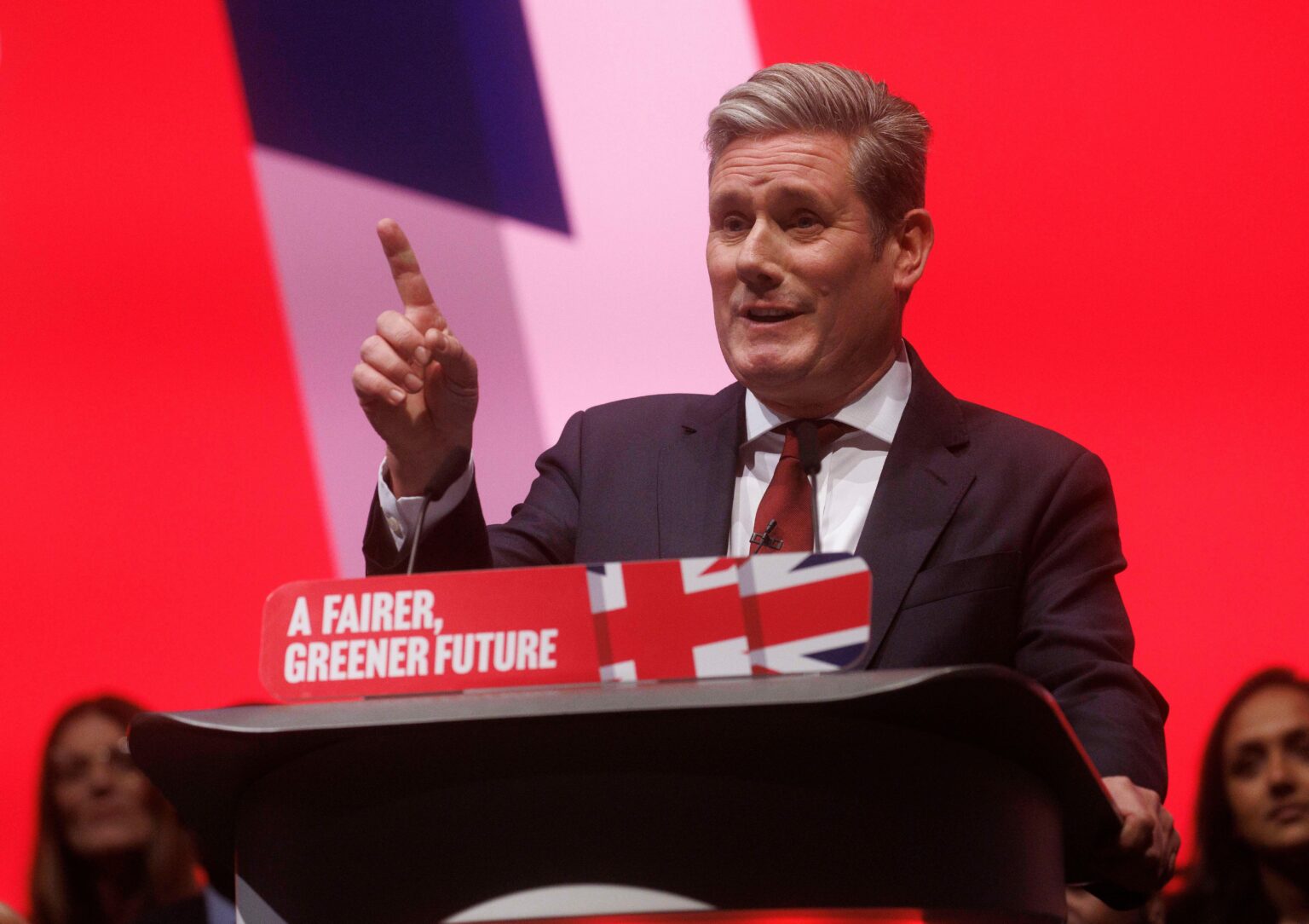Hydrogen lobbyists are targeting the Labour Party after betting on the opposition winning next year’s general election, DeSmog can reveal.
Energy policy will be a major focus at the October conferences of both major parties, which fall weeks after Prime Minister Rishi Sunak dramatically announced plans to water down the UK’s green targets.
Emails seen by DeSmog reveal that the hydrogen lobby is now pivoting to Labour as the party most likely to win the next election. It comes after campaigners last year accused the hydrogen lobby of targeting the Labour conference with false solutions.
The communications were sent by Beyond2050, a PR agency and consultancy, which represents the UK’s biggest gas distributors and will be coordinating a “Hydrogen Zone” at the Labour and Conservative party conferences.
A number of the agency’s clients are expected to use their stands in the zone to promote the controversial and widely discredited use of hydrogen for home heating, which is favoured by the industry as it can combine with natural gas, and its existing infrastructure.
The Beyond2050 newsletter has also shared that “key politicians” may attend the networking drinks it is hosting at the Conservative meeting in Manchester (1-4 October) and at Labour’s conference in Liverpool (8-11 October).
“The coming months are a key timeframe for the hydrogen industry to engage with the Labour Party,” wrote Beyond2050 founder and director Rob Dale in a newsletter sent to industry figures, politicians and journalists earlier this month.
“Labour continue to maintain a strong lead in the opinion polls and are on track to gain enough seats to win a majority at the next election.”
Latest polling shows Labour increasing its lead ahead of the Conservatives. An Ipsos poll also found that 86 percent of British people believe the UK needs a fresh team of leaders.
Experts have warned that exaggerating the potential of hydrogen could delay action on tackling climate change by obstructing the rollout of renewables and keeping the fossil fuel industry alive. Steve Goodrich, head of research and investigations at Transparency International UK, has warned politicians to be wary of industry influence.
“As the prospect of a general election looms, business interests will be redoubling their efforts to influence any potential government or minister,” Goodrich told DeSmog.
“Many of the groups behind this effort remain largely unchecked by formal rules. Without greater transparency over lobbying, much of what happens in these groups will remain behind closed doors.”
Blue, Green and Grey
Beyond2050 describes itself as the “leading strategy and political relations agency on hydrogen”, working with “some of the UK’s most innovative hydrogen businesses and entrepreneurs”.
The website makes no mention of gas, though gas companies make up half of its clients featured in the ‘Hydrogen Zone’. They include gas distributors Cadent, SGN, Wales & West Utilities and Northern Gas Networks, British Gas owner Centrica, Britain’s gas network owner National Gas, and gas boiler manufacturer Baxi.
All these companies became Beyond2050 clients this year, according to the UK’s main lobbying registers, despite growing concerns over the use of hydrogen to replace gas in heating. At present neither the UN’s leading climate body the Intergovernmental Panel on Climate Change (IPCC) or the UK’s climate change committee see a major role for hydrogen in decarbonising homes.
Nearly a quarter of the UK’s total greenhouse gas emissions (22 percent) come from heat in buildings. Experts say insulation along with the installation of electricity-powered heat pumps are the safest, most energy efficient way to heat homes – and up to three times cheaper than using hydrogen.
The UK government is due to make a decision in 2026 on whether to allow ‘hydrogen-ready’ boilers. However, in July then energy secretary Grant Shapps cast doubt over whether hydrogen will ever be a viable form of heating. The Department for Energy Security and Net Zero has not yet responded to DeSmog’s request for an update.
In a statement to DeSmog, a Beyond2050 spokesperson said the company “work[s] with companies that are also solely focused on the production of green hydrogen, as well as others across the hydrogen value chain”. Clients working solely on green hydrogen to decarbonise industrial processes include JCB, Ryze and Johnson Matthey.
Producing ‘green’ hydrogen involves using electrolysis powered by solar and wind to split water and create the final product, and is widely seen as an important way to decarbonise industrial processes where it is hard to avoid greenhouse gas emissions. However, it is more scarce, expensive and energy intensive than other forms of hydrogen. As a result, ‘grey’ fossil-based hydrogen made with natural gas or coal makes up 96 percent of existing supplies globally.
A Beyond2050 spokesperson said those participating in the zone “represent the breadth of the UK’s hydrogen industry and include hydrogen production, hydrogen transportation, storage and mobility, as well as those working on hydrogen for heat”.
Carla Denyer, co-leader of the Green Party, told DeSmog: “There is a role for green hydrogen in a zero-carbon future but given supplies will remain limited for the foreseeable future, it’s a very small and specific role.
“In particular, hydrogen must be kept out of our homes. It is a highly inefficient and expensive method of heating.”
‘Across The Value Chain’
The ‘Hydrogen Zone’ has advertised a networking drinks with “key politicians”, open to “all those interested in the UK’s hydrogen industry”, according to the weekly HY News newsletter circulated by Beyond2050.
“As a reminder, last year Prime Minister Liz Truss attended the zone for a private drinks reception at Conservatives,” says one newsletter, which was sent on 8 September.
The email notes that Alan Whitehead, Shadow Secretary for Energy Security and Net Zero, and Bill Esterson, Shadow Business Minister, were also present at the “informal drinks” held last year at Labour’s Hydrogen Zone.
HY News also reported extensively on the Labour reshuffle in early September, concluding that the current line-up may become senior government figures. The next general election is due to take place next year, with a vote predicted for sometime around May.
“This reshuffle matters because a large proportion of the shadow ministers in these roles today would become ministers in a Starmer administration,” Beyond2050’s Director Rob Dale wrote.
He added that this meant they now had “a suitable amount of time to develop their plans for government, meaning the coming months are a key timeframe for the hydrogen industry to engage with the Labour Party”.
Insights into policy-making is a specialty of the company, whose claim that its team has worked “at the highest levels of politics” appears to be well-founded.
Policy and strategy director Rita Wadey led the development of the UK’s government’s Hydrogen Strategy before taking a position at Beyond2050 in April 2022. In July, she left the company to start a new position as hydrogen strategic advisor at the National Grid.
The UK hydrogen strategy, which doubled in ambition last year to deliver 10GW of domestic production by 2030, involves a “twin-tracked” approach of promoting both renewables-powered ‘green’ hydrogen and ‘blue’ hydrogen, where the emissions from fossil hydrogen are stored and captured underground.
But ‘blue’ hydrogen is also controversial. A 2022 report by the Institute for Energy Economics and Financial Analysis (IEEFA) found its production in the UK to be risky, ineffective, and to offer a poor financial investment.
The Labour Party was asked by DeSmog to clarify its plans for hydrogen in the UK’s decarbonisation, but had not responded by the time of publication.
Major Hydrogen Presence
DeSmog reported last week that a number of oil and gas firms are set to be present at the Conservative Party conference, including Beyond2050 clients Cadent, National Gas and Centrica.
National Gas will also be hosting an event at the Labour Party conference on October 9 with the New Statesman, titled: “Stronger, Fairer, Greener: How Can Hydrogen Protect Industry, Create Jobs and Power Us to Net Zero?” Bill Esterson, shadow business minister, will be speaking on the panel.
Trade association Hydrogen UK and Ineos also have exhibitor stands at both conferences. Petrochemicals company Ineos has pivoted towards hydrogen – which it describes as a “game-changing source of energy that can be used as both a raw material for industry and as a power source for transport and the home”.
Oil and gas major BP, which joined Beyond2050 as a client in March this year, also has a stand at the Conservatives conference. According to the conference agenda, the company will demonstrate how it is “in action on the challenge… transforming Teesside and tackling emissions with CCS and hydrogen”. BP is currently consulting on its proposal for H2Teesside. The planned project with UAE state-owned company Adnoc aims to be one of the biggest blue hydrogen production facilities in the UK.
In a statement to DeSmog, Rob Dale quoted Chris Stark, the chief executive of the Climate Change Committee, who tweeted earlier this year that hydrogen would play “an absolutely essential role in the 2035 energy system”.
“We work with businesses who are seeking to achieve this aim,” Dale said, adding that: “Conference delegates will be able to speak with industry about all aspects of the Government’s UK Hydrogen Strategy.”
However, campaigners say the promotion of certain types of hydrogen could be a “dangerous distraction” from solutions needed to decarbonise and increase energy security.
“Hydrogen for home heating has become the emperor’s new clothing for the oil and gas industry,” said Alice Harrison, fossil fuels campaign lead at Global Witness. “It is a thinly veiled attempt for these companies to stay profitable, and to carry on polluting while pretending to be green.”
The hydrogen lobby often used public affairs firms backed by significant fossil fuel money to achieve their aims, Harrison said.
“It’s a classic tactic straight from the fossil fuel playbook that risks eroding our democracy,” she said. “Our decision-makers should be wary of lobbyists who come bearing gifts and promise the world.”
Subscribe to our newsletter
Stay up to date with DeSmog news and alerts







